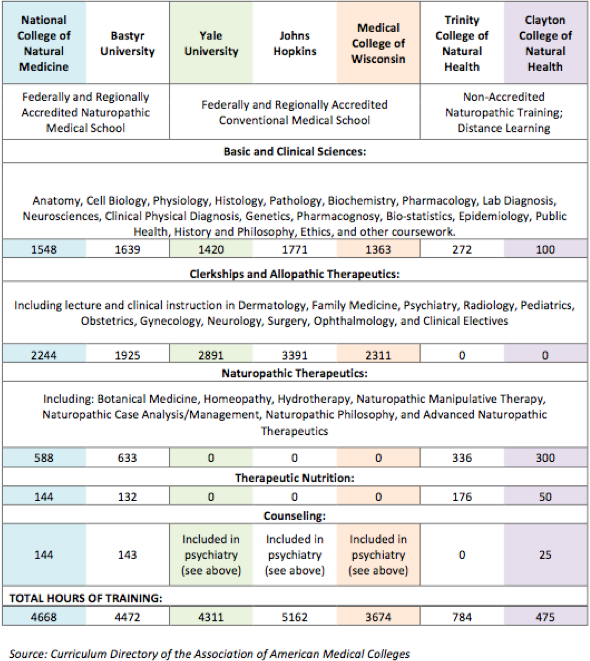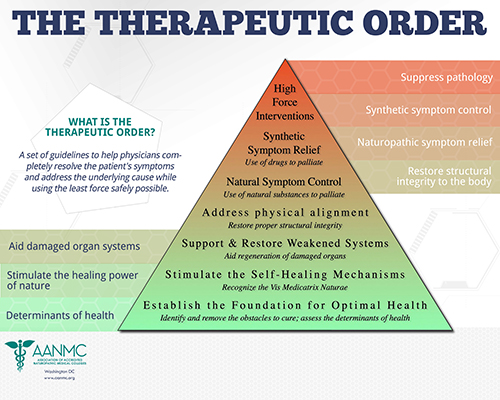
Naturopathic Medicine
Naturopathic Medicine
Naturopathic medicine is a distinct system of primary health care -an art, science, philosophy, and practice of diagnosis, treatment, and prevention of illness. Naturopathic medicine is distinguished by the principles which underlie and determine its practice. These principles are based upon the objective observation of the nature of health and disease and are continually reexamined in the light of scientific advances. Methods used are consistent with these principles and are chosen upon the basis of patient individuality. Naturopathic physicians are trained as primary health care physicians whose diverse techniques include modern and traditional, scientific and empirical methods.
Training to Become a Naturopathic Doctor
Naturopathic Doctors attend four years of post-graduate doctoral medical training at an accredited naturopathic medical school where they are trained as primary care physicians integrating traditional healing methods with modern scientific medicine. The training involves four years of courses with two years of supervised clinical rotations toward becoming a primary care physician. The curriculum involves the basic sciences and clinical courses similar to most major medical schools with additional training in diet and nutrient therapies, botanical medicine, osseous and soft tissue manipulation, hydrotherapy, counseling, and homeopathy.
What is the Difference Between Naturopathic Doctors and M.D.s ?
In my opinion, the main difference is that ND's focus more time on patient care. In the United States, consultation time for conventional doctor's appointments averages perhaps 20 minutes. IN contrast, NDs spend between 1 and 2 hours face-to-face with patients n an initial appointment and 30 to 60 minutes in subsequent appointments. There are approximately 6000 NDs practicing in North America.
One other difference is our education. While very similar, there are some key differences, especially in botanical medicine and lifestyle modification. NDs are unique among medical practitioners in their depth of knowledge about diet and nutrition as it applies to specific patient care. For more information see this link.
So How Does An ND Compare To An MD ?
Both an ND and MD received an undergraduate degree in premedical studies, graduated from an accredited medical school, and have spent hundreds of hours working with practicing physicians in a clinical setting. MD’s are required to do a residency program where they complete rotations in many of the major fields of conventional medicine- surgery, pediatrics, family medicine, etc. ND’s complete majority of their clinical training in family based clinics. Residencies are available for ND’s after graduation, but are not mandatory. This is likely to change in the future when more states gain licensure and there are more practicing ND’s.
Here is a chart comparing the curriculum of naturopathic medical schools (Bastyr and NCNM) with conventional medical schools (Yale, Johns Hopkins, Wisconsin). The schools on the far right are 2 non-accredited naturopathic schools. Students graduating from these schools are NOT naturopathic physicians but may use the term “doctor” in states where naturopathic medicine is unlicensed.
Minnesota is unique in North America in that the state has licensed Naturopathic Doctors but also allows anyone to call themselves a Naturopath with any level or no level of training. And while there are some well-meaning practitioners in the State who do a fine job, there is no guarantee of their education, clinical training, or qualifications. So how do you tell the difference? Trained and Licensed Naturopathic Doctors have the exclusive right to the use of the term Naturopathic Doctor. If it is important to you you can look up all licensed NDs here.

So are you a Homeopath or what ?
There is a great deal of terminology used to describe Naturopathic Medicine, but they don’t all mean the same thing, and the majority of them shouldn’t be used interchangeably, but, unfortunately often are.
What Is The Naturopathic System Of Healing And Therapeutic Order?
Naturopathic medicine is a comprehensive and holistic approach to medicine based on the healing power of nature and focuses on the prevention and treatment of underlying disease. ND’s abide by six key elements of medicine:
- The healing power of nature
- Identify and treat the causes
- First do no harm
- Doctor as teacher
- Treat the whole person
- Prevention
Using these principles, ND’s practice a holistic approach to well-being by focusing on treating the whole person: physical, emotional, mental, and spiritual health. Wellness is a continually changing state of being healthy, and health is an inherent need for everyone. The ND is uniquely qualified to promote optimum health for all patients of all ages.

Naturopaths use The Therapeutic Order to ensure proper treatment of symptoms by addressing the underlying disturbance.
For example, a patient with a common cold may use a common cold remedy to stop their running nose. This is a high force intervention aimed at suppressing the symptom. Another way to address the same runny nose is to consider the cause of it. For simplification, let’s say the common cold is due to a viral infection. Your body wants to be healthy and is producing a runny nose because your immune system is fighting the infection. Therefore suppressing the runny nose is suppressing your healing.
A naturopathic approach would be to support the immune system, provide low force antiviral therapies, and allow the body to do what it does best – to be healthy.

